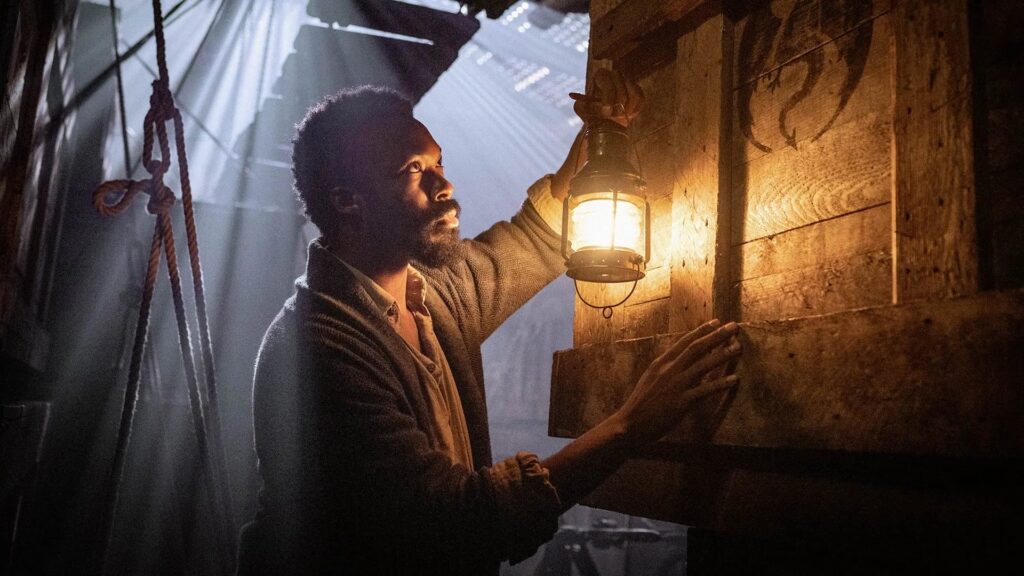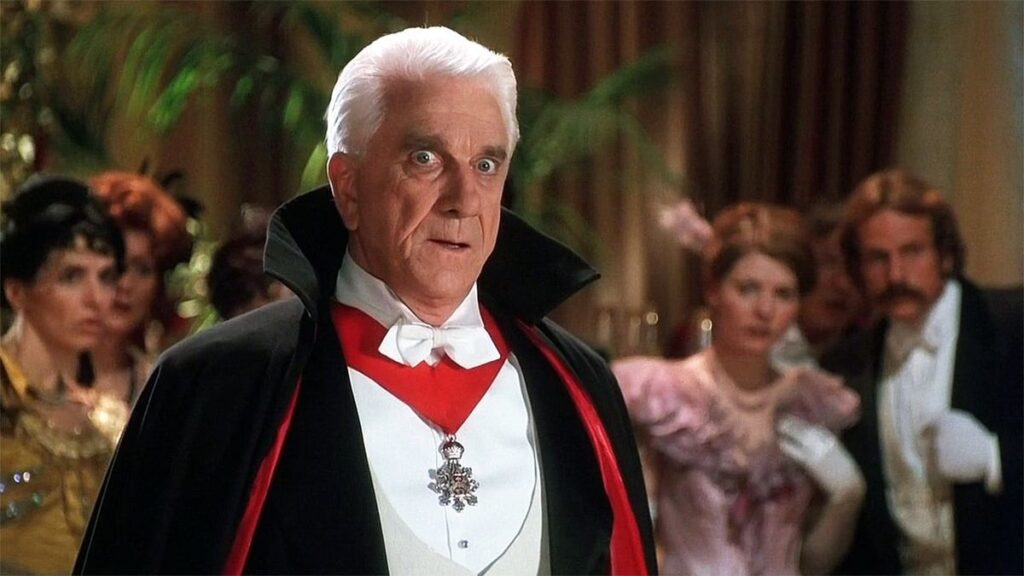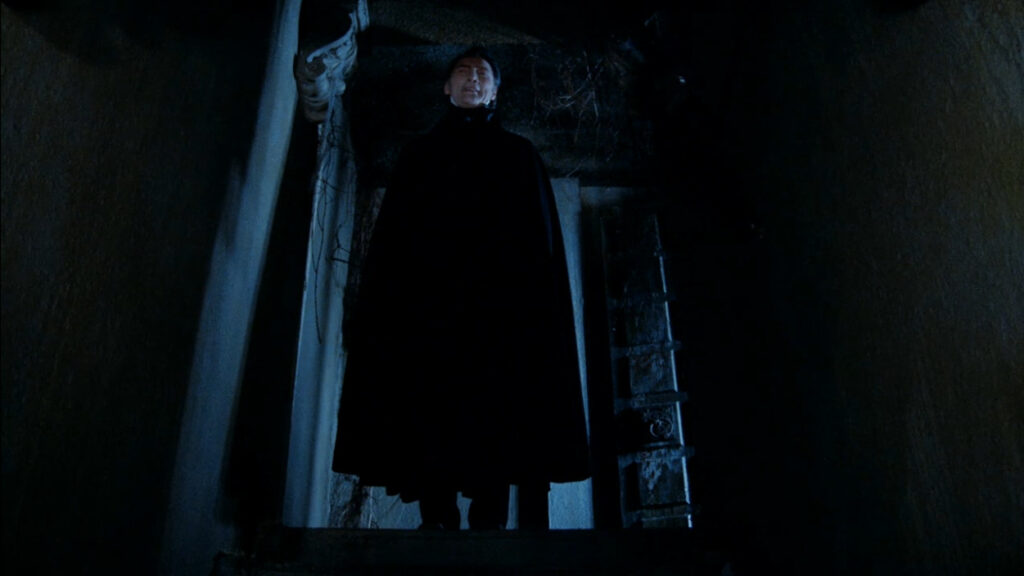Bram Stoker created the character of Count Dracula in his 1897 novel Dracula, and perhaps owing to the novel’s swift entrance into the public domain (at least, in the USA), he has appeared in more films than any other character, fictional or otherwise, except for Sherlock Holmes (which, incidentally, includes stories with both characters.) There have been over 30 straight movie adaptations of the novel and countless ancillary appearances, not to mention inclusions in television, stage, and other literature. Just last year, we had two Dracula-adjacent flicks with major releases (more on one of them below), and we’re about to get another Nosferatu from Robert Eggers later this year (not to mention the rumored Sci-Fi Western version of Dracula from Chloé Zhao), so the character has proven quite resilient.
I actually kicked off the Six Weeks of Halloween a little early by listening to the Audible Edition Audiobook, which was fantastic (I want to say that I read this in my teen years, but honestly, a lot of this felt new, so maybe I never got too far back then), and have been going through a Dracula kick in movies as well. We’ll most likely see more of these in the inevitable 6WH Speed Round, but here are three new-to-me Dracula flicks:
Six Weeks of Halloween: Week 1.5 – Draculas
- Dracula (1931) (trailer)
- Is that a whip? (Robot Chicken)
- Renfield (trailer)
The Last Voyage of the Demeter – On paper, this movie seems like it should work like gangbusters. Based on a short (about 5 pages) but evocative and memorable excerpt from Stoker’s original novel about Dracula’s voyage from Carpathia to London where it’s implied that he murders the entire crew, it’s an interesting pressure-cooker of a premise that leaves plenty of room to fill in details (even if we sorta how it will end). The sea is dope! The cast is filled with solid character actors doing yeoman’s work. The director and crew are also known for their sturdy craftsmanship. Add this all together, and somehow, you get a bit of a slog.

Perhaps this is because we know where this is likely to end up, which robs some of the impact of the deaths, even the more gratuitous ones (there’s a child and dog onboard, but their fate is pretty much a foregone conclusion, despite some solid tension being developed in isolated sequences). It’s definitely a bit too long. Clocking in at nearly 2 hours, it really stagnates once you get underway, which is weird, because the characters are a little thin and underdeveloped too. The plans our heroes devise to combat the creature aren’t very clever and they’re obviously ineffective (and, well, they can’t be that successful, least the story diverge too far from the source). I guess the premise isn’t quite the slam dunk it might seem upon first glance. I’d be curious how well it would work if you cut out 20-30 minutes and then withheld the names of Dracula and maybe even the Demeter (to throw us nerds off the scent) until much later in the movie. It might make for a better film, but I’m guessing a studio would never go for that – the marketing kinda hinges on Dracula.
Speaking of whom, this is an interesting take on the classic fiend. Over the last 125 years of countless appearances in film, television, and more, Dracula has suffered from Flanderization, where a character’s initial complexity gets distilled and simplified to the point where they become almost a caricature of themselves. With Dracula, this has usually taken the form of overemphasis on his sex appeal and adding an element of gothic melodrama to his story. Often, the truly monstrous nature of the character is downplayed in favor of providing a sympathetic backstory or a romantic subtext. Take this to its logical conclusion and you wind up with the sparkly lovestruck vampires of Twilight or the horndogs of True Blood. The interesting thing about The Last Voyage of the Demeter is that it has also Flanderized Dracula, just in the opposite, more monstrous direction. It’s an approach I’d normally approve of, especially if his identity was withheld until later in the movie, but all we really see is a generic boogeyman who pops up to slaughter a crewman every few minutes. It’s still interesting and the creature design is well done, but it feels a bit off for Dracula (who has more personality and cunning than we see here)…
The other major criticism this movie has garnered is with the ending, a transparent attempt to set up a sequel in which our hero (who, spoiler alert, does manage to become the sole human survivor of the Demeter) vows to hunt down Dracula. I guess the implication is that he’ll hook up with Van Helsing and friends later down the pike, but since this character doesn’t appear in the novel, I like to think that his quest for revenge is completely fruitless and that the sequel would just be him constantly three steps behind Dracula and two steps behind Van Helsing until they all finally meet up and he sees that Drac is already dead. This movie also suffers a bit from the modern cinematographic obsession with overly dark photography. It’s far from the worst offender, and it’s clear that the director and cinematographer know what they’re doing because much of the movie looks great, but the calibration is just off on some sequences, which are far too murky and dark (particularly the opening and fog soaked ending). Ultimately, there’s lots to like about the movie, but nothing quite coheres the way it should. **
- A party hosted by a vampire (Robot Chicken)
- Young Frankenstein (trailer)
- The Netherbeast of Berm-Tech Industries, Inc. (short)
Dracula: Dead and Loving It – I suppose it was inevitable that the man who made Young Frankenstein would eventually take on the other major Universal monster, and thus we get this surprisingly bland take on Dracula. Mel Brooks is obviously a fan of those original Universal monster movies, and this is clearly patterned after Tod Browning’s 1931 adaptation of Dracula. Indeed, this movie plays mostly like a straight remake of that film, with some light jokes scattered around for good measure.

The problem is that the joke density is quite low, and much of what’s there doesn’t land very well. There are a few good bits though. There’s a running gag about Dracula’s shadow (a clear reference to Bram Stoker’s Dracula, which had come out only a few years earlier) that’s pretty good, and I love the splatstick bit when Harker drives the stake into Lucy’s heart. Leslie Neilson plays the titular Dracula to decent enough effect, and I like the way Peter MacNicol hams it up as Renfield. Mel Brooks himself shows up as Van Helsing, and he’s pretty good onscreen, even if his work behind the camera isn’t particularly great. I wonder if this movie would look better if it were just shot in black and white? As it is, it feels visually uninspired and flat.
I don’t know, I chuckled a few times and it’s always nice to sprinkle some comedies in with all the horror during this sort of marathon, but it’s also lethargic and largely unsuccessful. I could see it striking a chord if you saw it at a certain age, and I bet if I had seen this back when it came out, I might have a pleasant nostalgia for it today. It’s hard not to like a Dracula movie staring Leslie Neilson directed by Mel Brooks, but they gave it their best shot, and it’s nowhere near Brooks’ best work. **
- Vampire 8:00-9:00 PM (Robot Chicken)
- The Simpsons: Treehouse of Horror IV: Bart Simpson’s Dracula (Disney+)
- Bram Stoker’s Dracula (trailer)
Dracula (1974) – Dan Curtis (of Dark Shadows fame) directed and Richard Matheson (of I Am Legend fame) wrote this relatively straightforward adaptation of Stoker’s novel. The most notable changes here are introducing the idea that Dracula is Vlad the Impaler (implied by the novel, but not explicitly stated) and adding a romantic subplot involving Dracula and a woman who resembles his deceased wife (in this case, Lucy Westenra). Both points would become a prominent part of Coppola’s Dracula in the 1990s, which expanded the ideas further. There are lots of other changes: Jonathan Harker is killed early on and comes back as a vampire thrall during the final showdown, and several major characters are excised altogether, including Renfield, John Seward, and Quincey Morris.

Jack Palance plays the Count here, to pretty good effect. He brings a certain stoic physicality to the role, but also shows some yearning towards his long lost love that injects a bittersweet note. He’s not quite as otherworldly or memorable as Bela Lugosi, but Palance brings a peculiar cadence that is fitting for the part. Unfortunately, the cast surrounding him isn’t quite up to the task. In particular, the Van Helsing is quite lacking, but the rest of the cast can’t quite hold the line either. Visually, Curtis does what he can, and it has some nice compositions, but that can’t really make up for the rest of it. This is definitely an interesting adaptation in that it introduces some ideas that would influence future takes on Drac, but it ultimately does come down somewhere in the middle of the pack of straight Dracula adaptations… **
Again, I will most definitely be watching more Dracula and Dracula-adjacent movies during the next six weeks, but they’ll probably have to wait for the traditional Speed Round. In the meantime, stay tuned for some Dario Argento, coming on Sunday…
I actually really enjoyed Last Voyage of the Demeter. It scratched that itch for a gothic monster movie I had. I may be predisposed to like it since a lot of people have found it middling. I loved the grotesque take on Dracula.
When you talk about seeing Dead and Loving It at the right age and having some nostalgia for it… Yep, that’s me. I saw it as a kid and found it hysterical. Watching as an adult, and especially after seeing Brooks’ other films, it’s definitely not his best effort. however, I do think it has some solid gags – such as the heart staking you referenced and I’m fond of Dracula’s “daymare,” goofy as that bit is – and Steven Weber and Peter MacNicol both give it their all. But I’m not going to pretend it’s a classic.
I really need to see the Palance version. I re-read the novel recently myself and have been itching to watch some Drac adaptations again.
I wonder if Last Voyage would have played better in the theater than it did at home. In particular, I’m allergic to that overly dark cinematography, but it does tend to look better on the big screen. I suspect I’d still be turned off by some of the other aspects of the movie though…
A lot of comedy is like that. Things you see at a certain age just hit differently.
There’s a Cinnemassacre video where he compares a bunch of the Dracula adaptations to see which follows the book most closely. The Palance version was middle of the pack, but it was clearly an influence on Coppola’s Dracula (which actually scored quite highly, despite diverging considerably from the book – it still has most of the key elements, even if it does have the whole backstory/love story for Drac). Jess Franco’s version scored the highest, if I recall correctly. I might try to make some room for that this October as well…